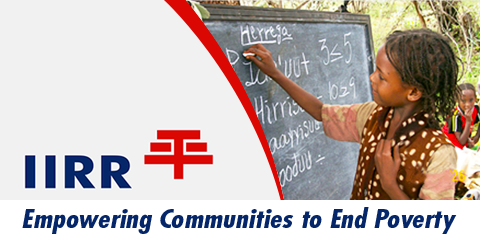Continuing the work of its founder, Dr. Y.C. James Yen, the International Institute of Rural Reconstruction advocates for a holistic and community-centered approach to development.
Building on almost 100 years of experience, IIRR’s programs are built on the beliefs that development should be:
- A community-led and managed approach
- Holistic and integrated
- Marginalized youth and women focused
- Built on partnerships and a community of practice
- Focused on knowledge generation and sharing
The two main methodologies that IIRR suggests to its program countries to follow are the Food Security and Livelihoods Resilience program (FSLR) and the Education for Marginalized Communities (EMP). Until 2020, program countries Kenya and Ethiopia will focus on education for pastoralist communities. Uganda, Cambodia, Myanmar, and the Philippines will focus on the Food Security and Resilient Livelihoods program.
The FSLR program seeks to contribute to the graduation of hundreds of thousands of the poor and marginalized rural households in Asia and Africa from poverty by addressing the multidimensional challenges of food, nutrition, and livelihood insecurities. Three program outcomes are anticipated:
- Extremely poor/vulnerable (marginalized communities, women, girls, elderly, children, people with special needs have access to social protection to graduate them from poverty
- Communities and households are food secure and can withstand shocks and uncertainties
- Communities, groups and individuals (youth and women in particular) have equitable access to resources and opportunities, accumulate assets and are able to withstand shocks.
The FSLR program will be characterized by the following five major thematic components:
- Sustainable intensification of agriculture-based livelihoods with special attention to youth and women
- Strengthening pro-poor rural value chains and developing small and micro-enterprises with special focus on youth and women
- Management of risks and vulnerabilities that threaten food, nutrition and livelihood security
- Health and nutrition
- Education for marginalized communities
The EMP program seeks to facilitate access to quality education, especially for pastoralist children and youths. By improving access to education and enhancing its relevance and quality, IIRR envisages achieving the following outcomes of its program by 2020:
- Pastoralist children and youth, particularly girls or young women, improve their academic performance;
- Schools in pastoralist areas substantially improve their retention, transition, progression and completion rates establishing a clear link across the educational system from early child development to secondary and tertiary education
- Youth, particularly pastoralist girls or young women, are economically empowered and ready for life.
- Sexual and reproductive health and rights as the basis for lifelong learning, especially for girls, is mainstreamed in the educational system.
- Strengthen community and school systems to prevent discrimination in all its forms (gender based violence, genital mutilation/cut, rights to SRHR, and others). n Support special needs children/youths in education and life skills development.
Building a global community of practice and collaborative leadership
Over time, IIRR created a niche for itself globally for linking capacity development (training) with field practice bridging the technical know-how of scientists with the practical ‘do-how’ of community experts. To date, good progress has been made towards developing various products and services in this regard.
In the coming years, IIRR will make deliberate efforts towards further consolidation and scaling up of building a community of practice by systematically documenting and sharing lessons widely. Key outcomes of this sub-program include:
- Build a stronger global community of practice by offering community driven trainings, study programs and technical services with the aim of contributing to building a Collaborative Leadership at national, regional and global scale.
- To remain effective and relevant, IIRR will ensure that the IIRR training and capacity building staff are actively engaged and connected to the development work at the community level.
- We will also establish mechanisms for capturing and packaging lessons using our writeshop process to improve curriculum and contents of our trainings and study programs.
- With strong presence in Eastern Africa and Southeast Asia, IIRR is strategically located to facilitate south-south exchange and learning. Revenues generated thought these activities will make IIRR financially resilient to continuously support our community work.
More details of IIRR’s strategy can be found here.


